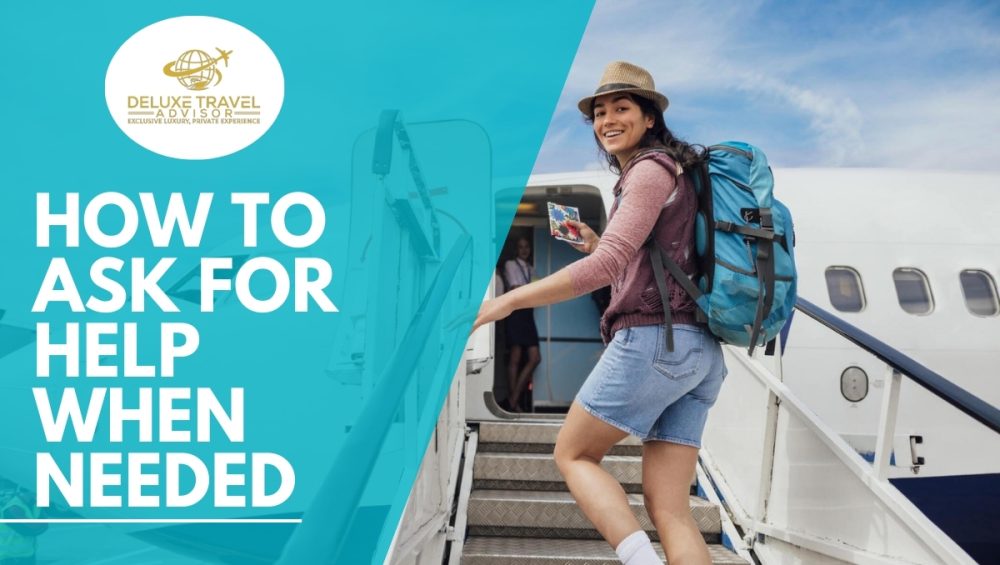Traveling can be an incredible adventure, but it’s normal to encounter moments where you need a helping hand. Whether you’ve lost your way, need a recommendation, or face an unexpected challenge, knowing how to ask for help will ease stress and enhance your travel experience. In this guide, we’ll explore key tips for getting the travel assistance you need.
- Overcome Hesitation
It’s natural to feel hesitant about asking for help in a foreign place, but don’t let fear hold you back. Most people are happy to assist a traveler in need. Recognize that overcoming your hesitation to ask for help traveling is a sign of resourcefulness, not weakness. A friendly smile and genuine request can open doors to unexpected kindness and local knowledge.
- Know Who to Ask
Identify trustworthy sources of assistance depending on your needs. Here’s a starting point:
- Hotel staff: Concierges and front desk personnel are excellent resources for directions, recommendations, and local insight.
- Tour guides: Their knowledge of the area is invaluable if you get lost or need advice on what to see and do.
- Shopkeepers and restaurant staff: Great for quick questions, local tips, and even getting a taste of the local language.
- Transportation personnel: Help with navigating public transport, understanding schedules, and even advice on the best ways to get around.
- Police or security officers: Essential for safety concerns or emergencies.
- Be Specific and Courteous
When you ask for help traveling, be clear and concise about your needs. Frame your requests politely, starting with “Excuse me…” or “Could you please help me…”. A simple “thank you” goes a long way in showing appreciation. If a language barrier exists, try using translation apps or simple gestures to communicate your needs. Remember, patience and a willingness to adapt are key.
Additional Tips:
- Learn a few basic phrases: Knowing how to say “Hello”, “Please”, “Thank you”, and “Where is…” in the local language can go a long way.
- Carry local contact information: Have the address of your hotel, your embassy’s information, and any essential phone numbers readily available.

Overcoming Language Barriers
When you’re traveling in a foreign country where you don’t speak the language fluently, asking for help can seem daunting. However, language barriers shouldn’t be an obstacle to getting the travel assistance you need. Here are some additional travel tips to smooth out communication:
- Technology to the Rescue: Translation apps on your smartphone are invaluable tools. They can help you translate simple phrases, ask for directions, and even help with more complex situations. Consider learning a few key phrases in the local language before you go for emergencies or to break the ice with locals.
- Picture This: Prepare a set of visual aids with common images or symbols representing what you might need – a map with a marked location, pictures of food items, or a written note in the local language explaining your situation. This can be especially useful if your translation app isn’t working perfectly.
- The Power of Gestures: Don’t underestimate the effectiveness of basic gestures like pointing or miming. People are often surprisingly adept at understanding what you need. Sometimes, a smile and a willingness to try your hand at sign language can work wonders!
- Seek out English speakers: In tourist areas, hotels, and transportation hubs, you’re likely to find people who can speak some English. Don’t be afraid to ask, “Do you speak English?” to identify potential helpers. Additionally, look for younger people – they are often more likely to have studied English in school.
- Language Exchange Apps: Before your trip, consider using language exchange apps to connect with locals who speak your language and are willing to offer some translation support in exchange for practicing their English skills.
Remember: Even if communication isn’t perfect, showing a willingness to try goes a long way. Most people appreciate your effort and will find ways to help you. Don’t be afraid to ask for help traveling – it might just lead to unexpected connections and a smoother trip.
Safety First: Prioritizing Caution When Seeking Help
While most people you’ll encounter during your travels are genuinely helpful, it’s essential to stay vigilant and prioritize your safety when you ask for help traveling. Here are some essential travel tips to keep in mind:
- Trust Your Instincts: If something feels off when interacting with someone, don’t hesitate to walk away and find another source of assistance. Always prioritize your gut feeling.
- Choose Your Surroundings: If you need to ask for help, try to do so in well-lit, populated areas. Avoid asking strangers for help in isolated or dimly lit locations, especially at night.
- Be Discreet: Avoid flashing valuable belongings or disclosing too much personal information. Keep your travel documents, passport, and essential cash in a secure location, like a money belt or a hidden pocket.
- Seek Official Sources: When in doubt, approach official personnel such as police officers, security guards, or staff at established businesses or transportation hubs. They are generally reliable sources of travel assistance and can guide you in the right direction.
- Stay Connected: Let a trusted friend or family member know your itinerary and check in with them regularly. If possible, carry a local SIM card or have a way to contact your embassy or consulate in the country you’re visiting.
Additional Safety Considerations:
- Pre-Trip Research: Before your trip, research common scams or safety concerns in your destination, so you’re aware of potential risks.
- Group Up: If you’re traveling solo, consider asking other travelers to join you in seeking assistance, especially if you need help at night or in unfamiliar areas.
Remember: Exercising a bit of caution can go a long way in ensuring a safe and enjoyable travel experience.
The Value of Preparation and Resourcefulness
While asking for help is a vital travel skill, being proactive and resourceful can often minimize the need for assistance and enhance your overall travel experience. Here’s how to prepare for those unexpected moments:
- Thorough Research: Invest time before your trip researching your destination. Learn about transportation options, local customs, essential phrases in the language, and potential safety concerns. This knowledge empowers you to navigate situations more smoothly.
- Travel Essentials: Pack smart. Carry a basic first-aid kit, a power bank for your phone, a light source, and a printed copy of important documents like your passport and itinerary. These essentials can be lifesavers in unexpected situations.
- Stay Informed: Download relevant apps for maps, translation, currency exchange, and local transportation schedules. These tools provide quick access to information, making you a more self-reliant traveler.
- Digital Backup: Upload scans of your passport, travel insurance details, and other essential documents to a cloud storage service. This ensures access to important information even if you lose your belongings.
- Adapt and Overcome: Travel often involves unexpected twists and turns. Maintain a positive attitude and a problem-solving mindset. Embracing flexibility and a sense of adventure will help you navigate challenges with a smile.
In Conclusion: A combination of smart preparation and a resourceful spirit will take you far on your travels. With the right information, tools, and mindset, you’ll feel empowered to face unexpected situations and become a more confident, independent traveler.





